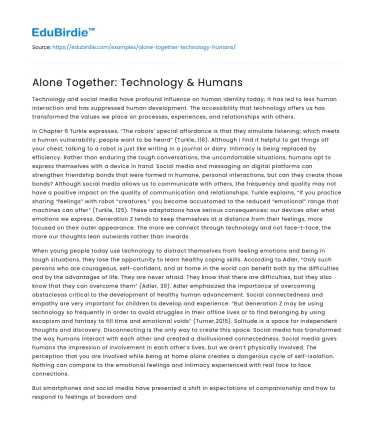Technology and social media have profound influence on human identity today; it has led to less human interaction and has suppressed human development. The accessibility that technology offers us has transformed the values we place on processes, experiences, and relationships with others.
In Chapter 6 Turkle expresses, “The robots’ special affordance is that they simulate listening; which meets a human vulnerability: people want to be heard” (Turkle, 116). Although I find it helpful to get things off your chest, talking to a robot is just like writing in a journal or diary. Intimacy is being replaced by efficiency. Rather than enduring the tough conversations, the uncomfortable situations, humans opt to express themselves with a device in hand. Social media and messaging on digital platforms can strengthen friendship bonds that were formed in humane, personal interactions, but can they create those bonds? Although social media allows us to communicate with others, the frequency and quality may not have a positive impact on the quality of communication and relationships. Turkle explains, “If you practice sharing “feelings” with robot “creatures,” you become accustomed to the reduced “emotional” range that machines can offer” (Turkle, 125). These adaptations have serious consequences; our devices alter what emotions we express. Generation Z tends to keep themselves at a distance from their feelings, more focused on their outer appearance. The more we connect through technology and not face-t-face, the more our thoughts lean outwards rather than inwards.
Save your time!
We can take care of your essay
- Proper editing and formatting
- Free revision, title page, and bibliography
- Flexible prices and money-back guarantee
When young people today use technology to distract themselves from feeling emotions and being in tough situations, they lose the opportunity to learn healthy coping skills. According to Adler, “Only such persons who are courageous, self-confident, and at home in the world can benefit both by the difficulties and by the advantages of life. They are never afraid. They know that there are difficulties, but they also know that they can overcome them” (Adler, 39). Adler emphasized the importance of overcoming obstaclesas critical to the development of healthy human advancement. Social connectedness and empathy are very important for children to develop and experience. “But Generation Z may be using technology so frequently in order to avoid struggles in their offline lives or to find belonging by using escapism and fantasy to fill time and emotional voids” (Turner,2015). Solitude is a space for independent thoughts and discovery. Disconnecting is the only way to create this space. Social media has transformed the way humans interact with each other and created a disillusioned connectedness. Social media gives humans the impression of involvement in each other’s lives, but we aren’t physically involved. The perception that you are involved while being at home alone creates a dangerous cycle of self-isolation. Nothing can compare to the emotional feelings and intimacy experienced with real face to face connections.
But smartphones and social media have presented a shift in expectations of companionship and how to respond to feelings of boredom and loneliness. There’s always the possibility of instant gratification at your fingertips. This has created a hunger that yearns for endless affirmation. Rather than accepting imperfection and human frailty, the norm has shifted towards vanity masked as self-love. Digital communities alone will always be unfulfilling for human beings in the end.
The example that parents set with their smartphones should be considered as well. Putting down phones and interacting one-on-one is crucial to build up their sense of self. Children need to connect with other people in order to find a sense of purpose. Turkle writes, “We work so hard to give expressive voices to our robots but are content not to use our own.” This voice can and should be encouraged at home.
References
- Adler, A. (2011). The science of living. Mansfield Centre, CT: Martino. (Original work published 1930)
- Turkle, Sherry. Alone Together: Why We Expect More from Technology and Less from Each Other. Basic Books, 2017.
- Turner, Anthony. “Generation Z: Technology and Social Interest.” The Journal of Individual Psychology, vol. 71, no. 2, 2015, pp. 103–113.






 Stuck on your essay?
Stuck on your essay?

